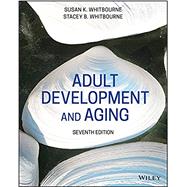The new edition of the leading textbook on the biopsychosocial processes of aging in adults, fully revised and updated.
Adult Development and Aging helps student readers understand the aging process both in themselves and in those around them. Approaching the subject from the biopsychosocial perspective — an innovative model of adult development that takes into account the influences and interactions of complex biological, psychological, and social processes — authors Susan Krauss Whitbourne and Stacey B. Whitbourne explore the latest concepts and applications in this exciting academic discipline. Based on Susan's classroom experience teaching her Psychology of Aging course, this engaging textbook integrates current research, real-world data, detailed explanations, and relatable examples to provide a balanced and accessible examination of the subject.
This fully updated and revised seventh edition offers inclusive coverage of recent advances in neuroscience and genetics, cognitive functions, vocational development, sociocultural influences, mental health issues, health and prevention, and much more. "AgeFeeds" provide key information for each chapter, while new graphics, charts, tables, and figures enhance the text's visual appeal and strengthen student comprehension and retention. Acclaimed for its depth, currency, and student-friendly presentation, this popular textbook:
- Uses a multidisciplinary approach for understanding adult aging and development
- Offers positive images of aging and the newest and most relevant research in the field
- Provides new and updated illustrations, references, quizzes, examples, and research
- Offers practical self-help tips and up-to-date links to online resources
- Includes extensive supplementary teaching and learning material including a test bank, PowerPoint slides, and an instructor’s manual
Adult Development and Aging: Biopsychosocial Perspectives, 7th Editionis an invaluable source of topically relevant information for traditional college-age learners and mature returning students alike, as well as for instructors and academic researchers in areas of adult aging and lifespan development.









